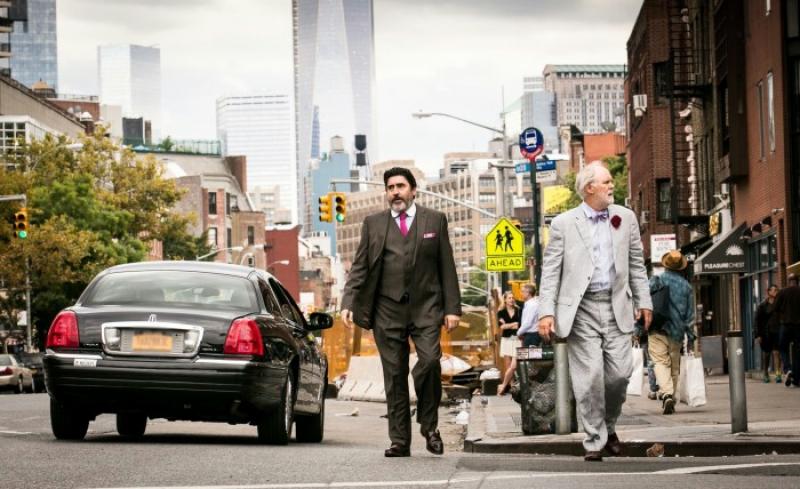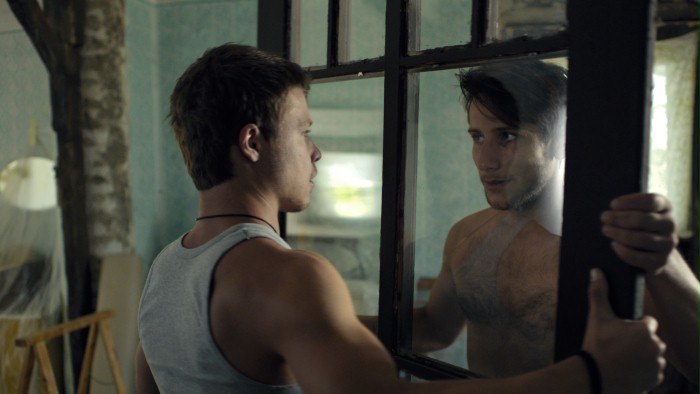Berlinale 2014: The Circle, Love Is Strange, Land of Storms, Praia do Futuro | reviews, news & interviews
Berlinale 2014: The Circle, Love Is Strange, Land of Storms, Praia do Futuro
Berlinale 2014: The Circle, Love Is Strange, Land of Storms, Praia do Futuro
The pick of the year's gay cinema at the Berlinale and its Teddy awards

Back in the 1950s the Zurich underground club Der Kreis was a rare beacon of tolerance of homosexuality in Europe. Fitting then that Swiss director Stefan Haupt’s drama-documentary of the same name, The Circle (****), won this year’s Teddy award at the Berlinale, in the documentary category: the Teddies have been going since 1987, making them no less of a pioneer in the gay world, their brief to acknowledge and support LGBT cinema from around the world.
Haupt’s film catches the unusual atmosphere of the venue, to which gay people would travel from surrounding countries where homosexuality was still illegal. It's centred on the story of teacher Ernst Ostertag and drag artist Robi Rapp; both now in their eighties, in 2003 they became the first gay couple in Switzerland to register their partnership. The structure around the Der Kreis club also produced a magazine (published under that title from 1942 until 1967) that set the trend for similar gay publications around the world, but the visual emphasis in the period recreations that are part of The Circle is on the flamboyant costume balls held there (pictured below right).
 Ostertag and Rapp appear in a present-day interview, movingly telling their stories. It reminds you how little attention gay cinema sometimes pays to the experience of the older generation; in that the film has elements in common with last year’s documentary Les invisibles (The Invisible Ones) from France, whose now senior gay and lesbian protagonists recalled their earlier years.
Ostertag and Rapp appear in a present-day interview, movingly telling their stories. It reminds you how little attention gay cinema sometimes pays to the experience of the older generation; in that the film has elements in common with last year’s documentary Les invisibles (The Invisible Ones) from France, whose now senior gay and lesbian protagonists recalled their earlier years.
There was something similar in Ira Sachs’s Love Is Strange (****), which like The Circle played in Berlinale’s Panorama section. The American indie director portrays an elderly New York gay couple, approaching the 40th anniversary of their relationship, who encounter trouble when new developments force changes in their life.
Sachs and his co-writer Mauricio Zacharias have created a very human drama
Alfred Molina plays George, a music teacher at a Catholic school: when he and his older, longterm partner, painter Ben (John Lithgow) marry, the repercussions include George’s dismissal from his job (even though school officials have long known of his sexuality). That forces them to downsize their living arrangements; while waiting for this to come to reality, each is forced to live apart, relying on the kindness of family and friends.
It’s an experience that proves fraught for all concerned, not least for the couple whose mutual companionship is paramount (even when they’re bickering). Ben ends up with his nephew and family, which causes them to reassess their own lives too, while George lodges with friends, two butch women cops who are neighbours. Sachs and his co-writer Mauricio Zacharias have created a very human drama - love is finally not that strange at all, but always complex and unpredictable - which should resound with all viewers, not least because of its memorable sense of the fabric of everyday life in New York (something Sachs’s previous film, Keep the Lights On, also caught brilliantly).
 Hungarian director Ádám Császi is in his mid-thirties, and his debut feature Land of Storms (****) proves that he can direct powerful drama. At its heart is the question of where its hero Szabolcs (Andras Sueto) belongs, and what his sexual nature really is: a talented football player, he’s left his native Hungary to play for a German team. But after defeat at a crucial match he quarrels with his best friend there, Bernard (Sebastian Urzendowsky), and returns home, choosing instead village life on his grandfather’s farm.
Hungarian director Ádám Császi is in his mid-thirties, and his debut feature Land of Storms (****) proves that he can direct powerful drama. At its heart is the question of where its hero Szabolcs (Andras Sueto) belongs, and what his sexual nature really is: a talented football player, he’s left his native Hungary to play for a German team. But after defeat at a crucial match he quarrels with his best friend there, Bernard (Sebastian Urzendowsky), and returns home, choosing instead village life on his grandfather’s farm.
What a grey view of the German capital this film gives
There he becomes friends with Aron (Adam Varga), a villager whom he first encounters when the latter tries to steal his motorbike (pictured above, Varga, left, with Sueto). When that friendship grows into something more intense, it causes ructions in the local community. Despite the arrival of Bernard in the village, and his declaration of affections he had kept hidden back in Germany, things seem to go well for a while, but, as the title suggests, there are storms brewing, and Császi moves his drama towards a darker conclusion.
The trio’s playing is tight and natural, and Császi knows when to let looks and images speak, as witnessed by his work with cinematography by Marcell Rev, who captures both the beauty and the loaded tensions of the wide Hungarian plains. Császi is definitely a director to look out for.
The fact that these three films impressed far more than the single gay-themed film in the Berlinale competition, the Portugese-German coproduction Praia do Futuro (**) was another reminder that at this festival the more interesting work is often to be found in the supporting sections rather than the main one.
 Brazilian helmer Karim Ainouz, who’s now based in Berlin, tells a story that begins by the Brazilian ocean on the “Beach of the Future” that gives the film its title. In tragic circumstances a relationship develops between Brazilian lifeguard Donato and a German world-wanderer Konrad. When Donato (Jesuita Brabosa, pictured above right, centre) follows his lover to Berlin, their relationship first blossoms, and then decays. But it’s far too scantily defined in the first place, allowing little room for viewers to feel anything deeper about their contact.
Brazilian helmer Karim Ainouz, who’s now based in Berlin, tells a story that begins by the Brazilian ocean on the “Beach of the Future” that gives the film its title. In tragic circumstances a relationship develops between Brazilian lifeguard Donato and a German world-wanderer Konrad. When Donato (Jesuita Brabosa, pictured above right, centre) follows his lover to Berlin, their relationship first blossoms, and then decays. But it’s far too scantily defined in the first place, allowing little room for viewers to feel anything deeper about their contact.
Berlin may give Donato the chance to reinvent himself, but it also finally reveals what he loses in the process. And what a grey view of the German capital this film gives - one which certainly is not the impression left by the city for Berlinale visitors. Melancholy is an emotion that only goes a certain distance.
Share this article
The future of Arts Journalism
You can stop theartsdesk.com closing!
We urgently need financing to survive. Our fundraising drive has thus far raised £49,000 but we need to reach £100,000 or we will be forced to close. Please contribute here: https://gofund.me/c3f6033d
And if you can forward this information to anyone who might assist, we’d be grateful.

Subscribe to theartsdesk.com
Thank you for continuing to read our work on theartsdesk.com. For unlimited access to every article in its entirety, including our archive of more than 15,000 pieces, we're asking for £5 per month or £40 per year. We feel it's a very good deal, and hope you do too.
To take a subscription now simply click here.
And if you're looking for that extra gift for a friend or family member, why not treat them to a theartsdesk.com gift subscription?
more Film
 28 Years Later review - an unsentimental, undead education
Allegorical mayhem in an eerily familiar zombie Britain
28 Years Later review - an unsentimental, undead education
Allegorical mayhem in an eerily familiar zombie Britain
 Red Path review - the dead know everything
A compelling story of a trail of Tunisian tears
Red Path review - the dead know everything
A compelling story of a trail of Tunisian tears
 Blu-ray: Darling
John Schlesinger's Sixties classic now feels problematic, but retains an icky fascination
Blu-ray: Darling
John Schlesinger's Sixties classic now feels problematic, but retains an icky fascination
 Tornado review - samurai swordswoman takes Scotland by storm
East meets West meets North of the Border in a wintry 18th-century actioner
Tornado review - samurai swordswoman takes Scotland by storm
East meets West meets North of the Border in a wintry 18th-century actioner
 Lollipop review - a family torn apart
Posy Sterling brilliantly conveys the torment of a homeless single mother denied her kids
Lollipop review - a family torn apart
Posy Sterling brilliantly conveys the torment of a homeless single mother denied her kids
 Big Star: The Nick Skelton Story review - the ways of a man with his mount
Documentary about the champion showjumping duo
Big Star: The Nick Skelton Story review - the ways of a man with his mount
Documentary about the champion showjumping duo
 Ballerina review - hollow point
Ana de Armas joins the Wick-verse to frenetic but soulless effect
Ballerina review - hollow point
Ana de Armas joins the Wick-verse to frenetic but soulless effect
 Blu-ray: Eclipse
The BFI has unearthed an unsettling 1977 thriller starring Tom Conti and Gay Hamilton
Blu-ray: Eclipse
The BFI has unearthed an unsettling 1977 thriller starring Tom Conti and Gay Hamilton
 The Ballad of Wallis Island review - the healing power of the old songs
Estranged folk duo reunites in a classy British comedy drama
The Ballad of Wallis Island review - the healing power of the old songs
Estranged folk duo reunites in a classy British comedy drama
 The Salt Path review - the transformative power of nature
Marianne Elliott brings Raynor Winn's memoir to the big screen
The Salt Path review - the transformative power of nature
Marianne Elliott brings Raynor Winn's memoir to the big screen

Add comment